Key takeaways:
- Peer mentorship fosters emotional support, diverse perspectives, and accountability, enhancing the growth of individuals in wildlife conservation.
- Engaging in real-life projects allows for the practical application of skills gained through mentorship, such as communication, collaboration, and problem-solving.
- Mentorship helps build community bonds and promotes a sense of collective responsibility toward wildlife conservation efforts.
- Future goals from mentorship experiences include creating collaborative projects, enhancing advocacy through storytelling, and mentoring the next generation of conservationists.
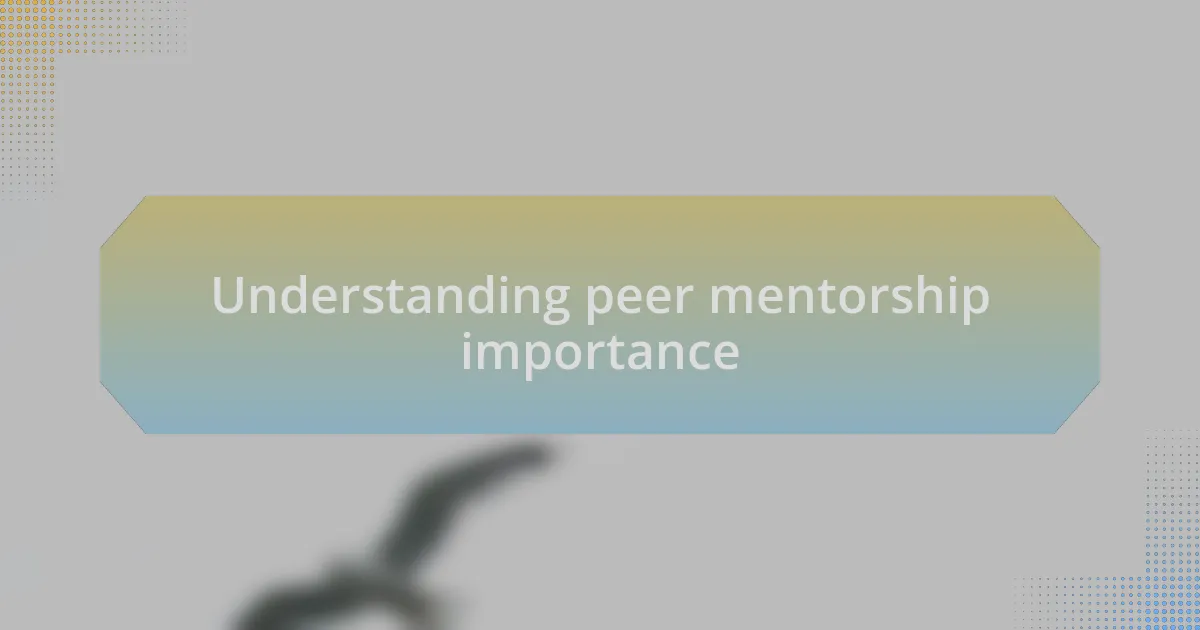
Understanding peer mentorship importance
Peer mentorship is a powerful tool for growth, especially in the realm of wildlife conservation. I vividly recall a time when my peer mentor guided me through a complex project on habitat restoration. The way they shared their experiences made the challenges feel less daunting and inspired me to push through obstacles.
The emotional support in peer mentorship can’t be understated; it creates a safe space for learning and exploration. Have you ever felt uncertain about your abilities? I have, and those moments of doubt were diffused when I found a mentor who had faced similar struggles. Their encouragement transformed my mindset, allowing me to embrace each learning experience.
Moreover, the importance of peer mentorship lies in the diversity of perspectives it offers. I learned that collaborating with peers exposes you to different methods of problem-solving, enriching your approach to conservation issues. How often do we miss opportunities for insight because we’re hesitant to reach out? In my experience, every conversation opened new doors, making me realize there’s strength in community learning.
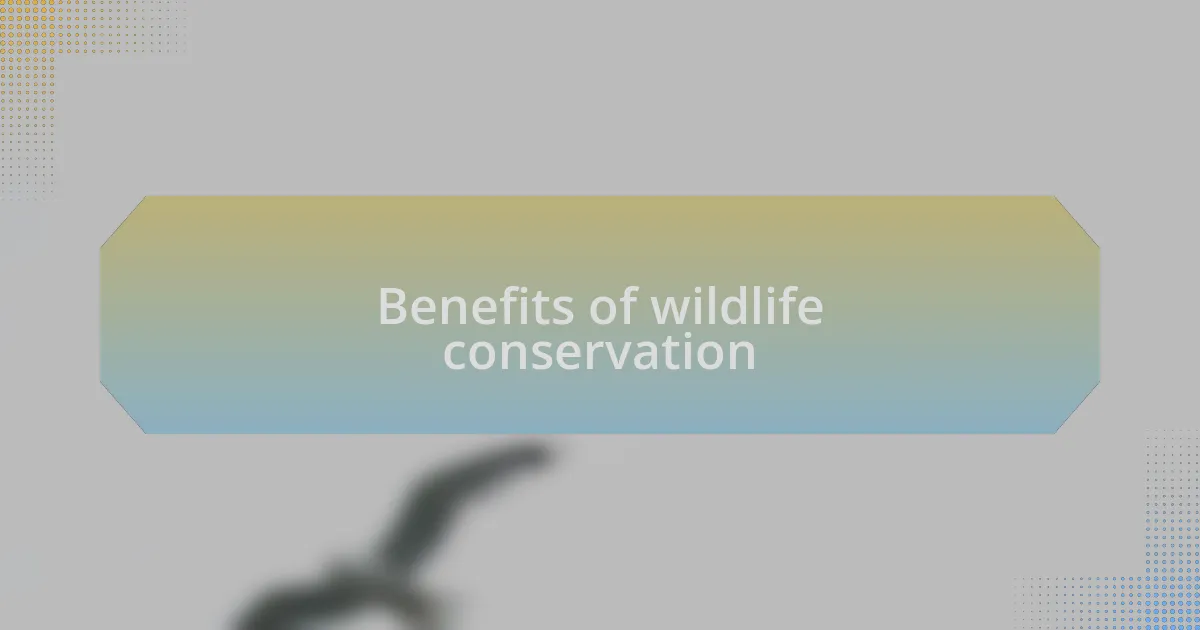
Benefits of wildlife conservation
Wildlife conservation brings numerous benefits that extend beyond just protecting species. For instance, preserving habitats ensures the continuity of ecosystems that provide vital services, such as clean air and water. I recall a field trip where we explored a protected wetland; not only did I learn about its rich biodiversity, but I also realized how crucial it is for flood control. It made me think: how often do we connect these dots in our daily lives?
Furthermore, conserving wildlife fosters a sense of community and encourages collective responsibility among individuals and organizations alike. When I participated in a local conservation initiative, the enthusiasm of my peers was infectious. We worked together to clean up a riverbank, and I felt a deep connection to my surroundings that I hadn’t experienced before. It’s fascinating how these shared efforts can cultivate a bond that strengthens our commitment to the environment.
Additionally, the economic benefits of wildlife conservation cannot be overlooked. Protecting natural areas can boost ecotourism, providing jobs and generating income for local communities. I met a ranger who shared stories of how their community thrived through responsible tourism, highlighting a successful balance between conservation and economic growth. Isn’t it inspiring how caring for wildlife can lead to both environmental and economic sustainability?
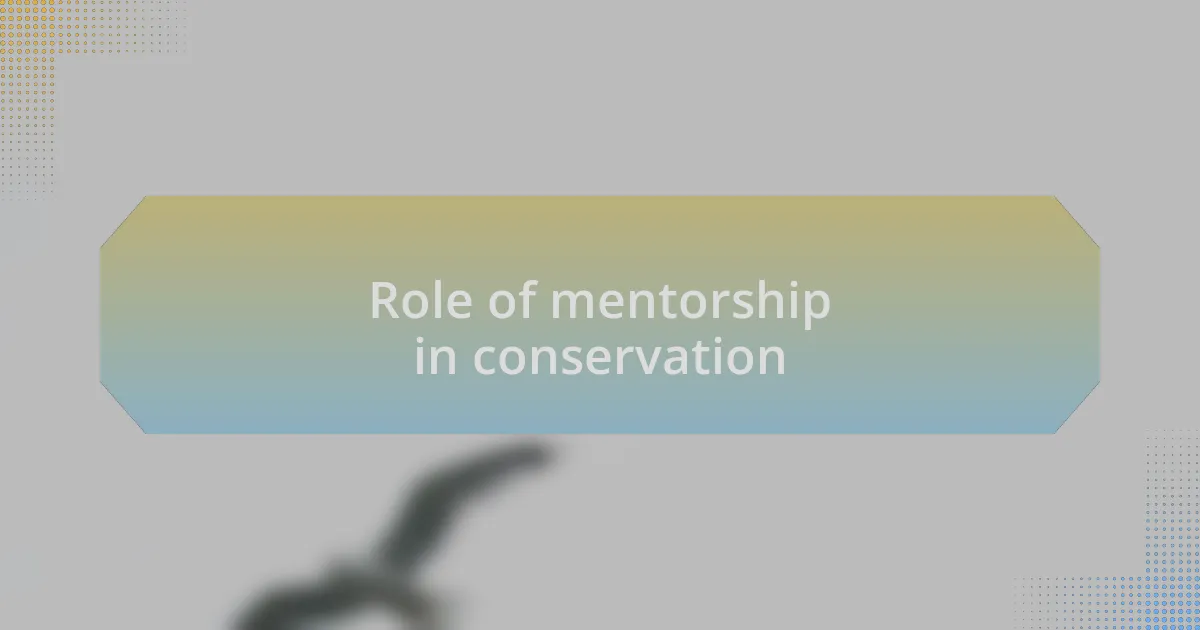
Role of mentorship in conservation
The guidance of experienced mentors in conservation can be transformative. I remember my first encounter with a seasoned wildlife biologist during an internship. Their insights into animal behavior not only deepened my understanding but also ignited a passion for research that I never knew I had. How often do we overlook the value of learning directly from someone who has navigated the challenges we face?
Mentorship creates a supportive framework where conservationists can share strategies and experiences. I once attended a workshop led by a mentor who shared their conservation failures, emphasizing the lessons learned through adversity. This vulnerability made me realize that setbacks are a natural part of the journey, prompting me to embrace challenges rather than shy away from them. Isn’t it reassuring to know we are not alone in our struggles?
Moreover, having a mentor fosters a sense of accountability within the conservation community. I recall a mentor challenging me to set specific goals for my conservation efforts. This prompted me not only to think critically about my contributions but also to stay committed to the cause. It’s intriguing how a simple nudge from someone who believes in us can amplify our impact on wildlife conservation.
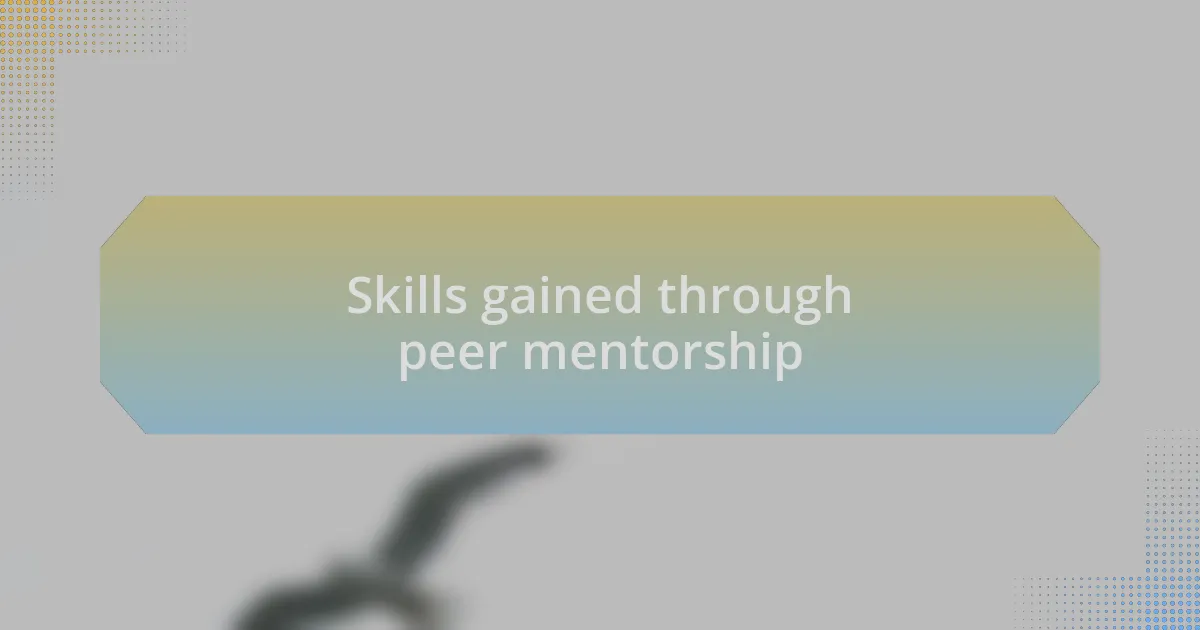
Skills gained through peer mentorship
Engaging in peer mentorship has significantly enhanced my communication skills, allowing me to convey complex conservation issues more clearly. I remember a time when my peer and I tackled a community outreach project together. We had to break down scientific concepts for a diverse audience, and through this experience, I learned how to tailor my message for different perspectives. Isn’t it fascinating how sharing knowledge can sharpen our ability to articulate ideas?
Another invaluable skill I acquired through mentorship was collaboration. Working alongside peers opened my eyes to the power of teamwork in tackling wildlife conservation challenges. During a group field study, we each brought our unique strengths to the table, whether it was data analysis or fieldwork expertise. I realized that embracing different viewpoints not only enriches solutions but also cultivates a deeper sense of community. Have you ever noticed how collaboration can lead to innovative strategies that one person alone might never envision?
Lastly, I’ve gained critical problem-solving skills through my mentorship experiences. In one instance, my peer and I encountered a significant obstacle while analyzing data for a project. Instead of becoming discouraged, we brainstormed solutions together, exploring various angles and methodologies. This collaborative approach not only led us to a resolution but also taught me to view challenges as opportunities for growth. Reflecting on this, I wonder how many breakthroughs in conservation are waiting to be discovered through shared perseverance.
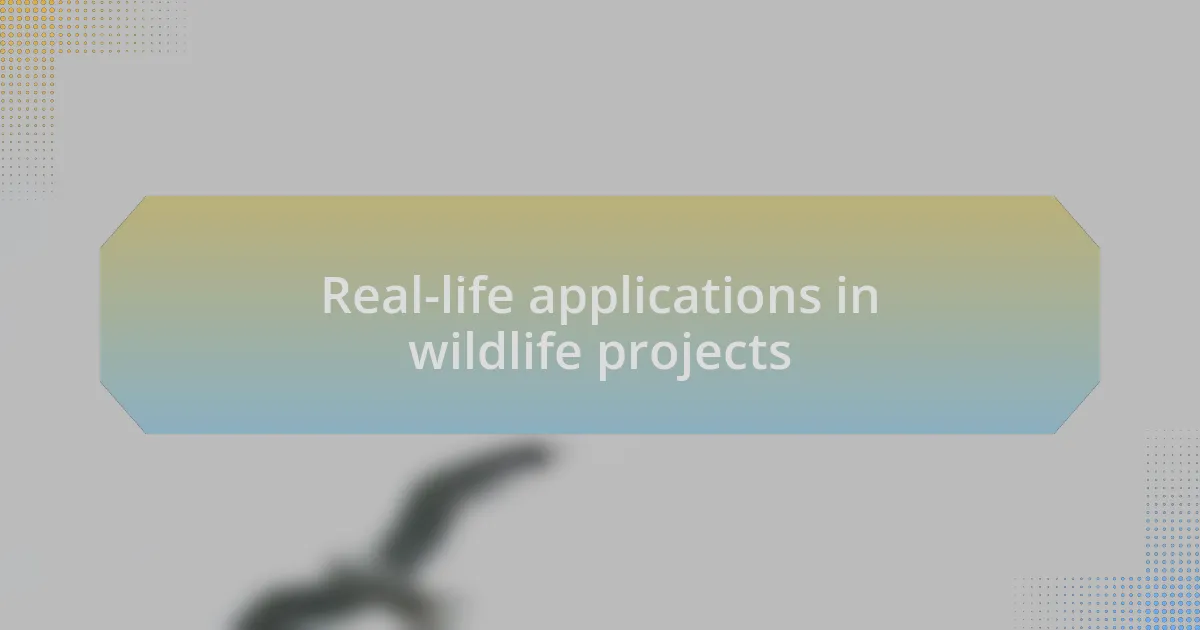
Real-life applications in wildlife projects
Real-life applications in wildlife projects
When it comes to real-world applications of the skills I developed through peer mentorship, I can’t help but think of a wildlife tracking initiative I participated in. We crafted a detailed plan to monitor animal movements using GPS collars. The collaboration we fostered made a remarkable difference; by sharing insights and techniques, we not only enhanced our project’s efficacy but also ensured we were being sensitive to the animals’ welfare. How often do we underestimate the impact of planning and executing together?
In another project focused on habitat restoration, my peer and I decided to conduct workshops for local communities. This small-scale initiative allowed us to practice our communication skills in a very relatable way. As we engaged with the community, I was struck by how our mentorship journey helped us break down complex restoration strategies into actionable steps. It made me wonder—how many successful conservation efforts start at the grassroots level through simple but effective sharing of knowledge?
One of the most profound experiences came during a wildlife census. I recall feeling nervous as we gathered data in a diverse ecosystem, unsure how well we could coordinate our efforts. However, thanks to the problem-solving techniques I learned through mentorship, I realized we could each take responsibility for different sections of the area. This division of labor not only alleviated some pressure but also showcased how our varied expertise could lead to a comprehensive understanding of the ecosystem. It raised a thought in me: can effective collaboration be the key to unlocking new realms of wildlife research?
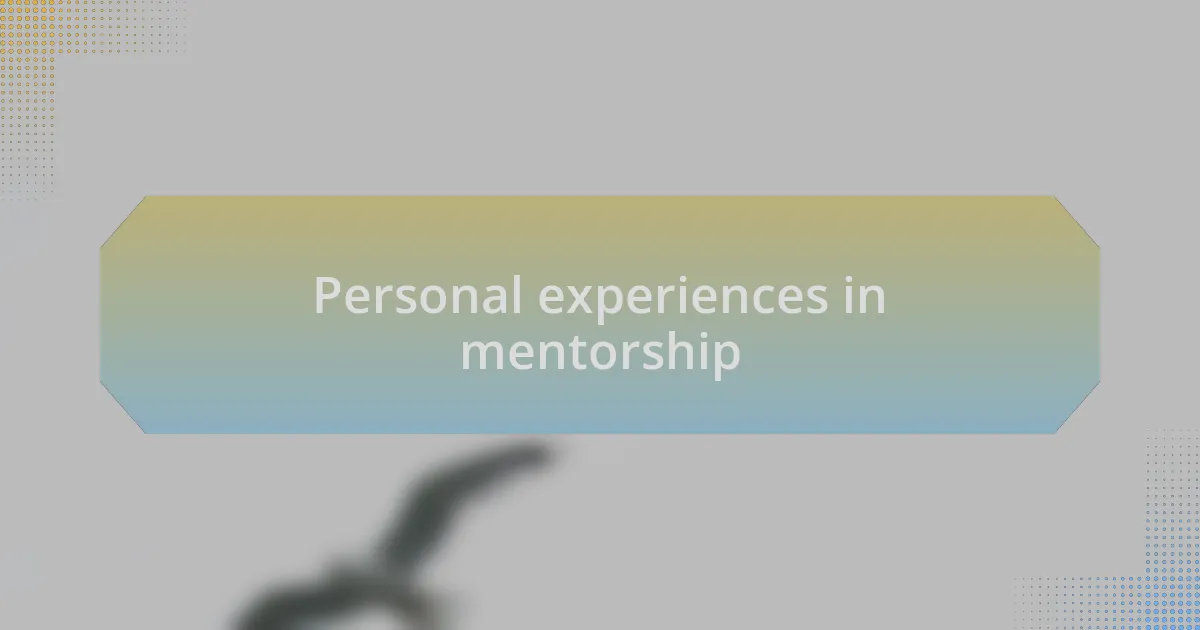
Personal experiences in mentorship
One of my most rewarding moments in peer mentorship came when I partnered with a fellow conservationist during a river cleanup project. I still remember the moment we first met to discuss our plans—there was an immediate exchange of ideas that sparked a deeper connection. I realized that mentorship isn’t just about sharing knowledge; it’s also about fostering an environment where both parties feel empowered to learn from each other. How often do we undervalue the strength found in collaboration?
I vividly recall a workshop we co-hosted to educate students about the importance of marine life preservation. Watching my peer engage with the audience, I felt the thrill of our combined efforts—the energy in the room was palpable. It struck me how mentorship flows both ways; while I shared my insights on wildlife, I learned valuable communication strategies that I hadn’t fully considered before. Isn’t it fascinating how sometimes the roles switch, and we become the students in our own right?
During another mentorship experience centered on species monitoring, I encountered challenges that truly tested my resilience. There were days filled with uncertainty and frustration while collecting data in unpredictable weather. Yet, my mentor’s encouragement to embrace a growth mindset transformed my outlook. Could it be that mentorship not only bolsters our skills but also cultivates a spirit of perseverance in the face of adversity?
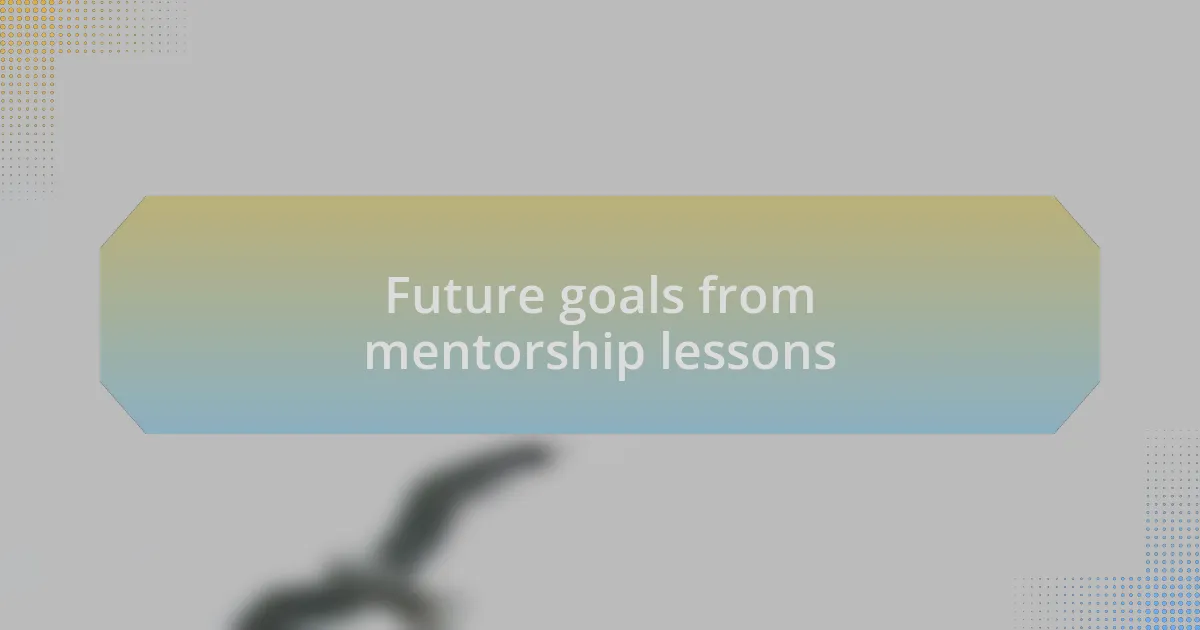
Future goals from mentorship lessons
As I reflect on my mentorship journey, I see a path of growth that extends beyond my immediate experiences. One goal I’ve set is to create more collaborative projects that harness collective strengths. Have you ever thought about how much more impactful our results could be when we combine diverse expertise? I envision a future where I initiate community conservation efforts, encouraging others to join and learn in the process.
Another objective is to enhance my advocacy skills by incorporating storytelling techniques I’ve learned from peers. I remember sitting in a discussion where someone shared their approach to weaving personal narratives into conservation campaigns. It hit me that relatable stories can be powerful. How can we reach more people if our messages resonate on a personal level? Moving forward, I aim to craft compelling narratives that inspire action in wildlife conservation efforts.
Additionally, I aspire to mentor others, passing down the lessons I’ve learned. The idea of guiding someone through their own challenges is both exciting and daunting. I recall receiving support during a critical moment in my career; that feeling of having someone believe in you can spark transformation. How rewarding would it be to offer that same encouragement to a budding conservationist? My goal is to create a cycle of mentorship that nurtures the next generation of wildlife advocates.